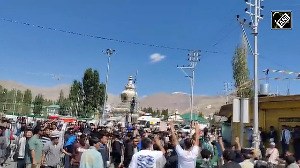"We hope the senate will vote this month," he told the third Indo-US economic summit in New Delhi. "If there is Senate action, we believe there will again be a large majority." He said the two bills then must be reconciled in a conference between the House of Representatives and the Senate and the final bill must be passed by both houses for signature by President George W Bush.
The fears of a delay have arisen in the wake of an insistence by some senators that the legislation on the civil nuclear deal be taken up for voting along with a domestic bill that provides for the US signing an additional protocol with the International Atomic Energy Agency on nuclear safeguards.
Mulford said while the civil nuclear agreement was being ratified by the Congress, the two countries must complete negotiations on a bilateral pact for peaceful atomic cooperation for the change in law to be effective.
"We both need to move forward on this legal framework expeditiously, working hard to complete the process before the present Congress completes its term this year," Mulford said.
His remarks came ahead of a crucial meeting between Foreign Secretary Shyam Saran and his US counterpart Nicholas Burns in New York to work out details of the bilateral nuclear agreement.
Affirming that Washington will honour the agreement that has been reached with New Delhi and that there was no move to shift the goalposts for the deal, Mulford said, "We are working with Congress to produce an act that reflects the spirit and terms of what the prime minister and the president agreed.
"Our leaders came to this agreement in partnership and they intend to proceed in partnership," he said. "President Bush understands the prime minister's concern about certain aspects of the draft legislation and has indicated to him our intention to complete the process," Mulford said.
The changes in US laws will bring about a cascade of revisions in India's international status. They will open the nuclear market not only for American companies but also for the entire international community, he said.
Mulford said this required the Nuclear Suppliers Group to alter its rules to allow civil nuclear commerce with India.
In addition, New Delhi will have to conclude a safeguards agreement and additional protocol with the International Atomic Energy Agency as a sign of its commitment to nuclear non-proliferation. Declaring that this would end India's isolation, Mulford said it would also mark the start of a new era for addressing the country's energy needs.





